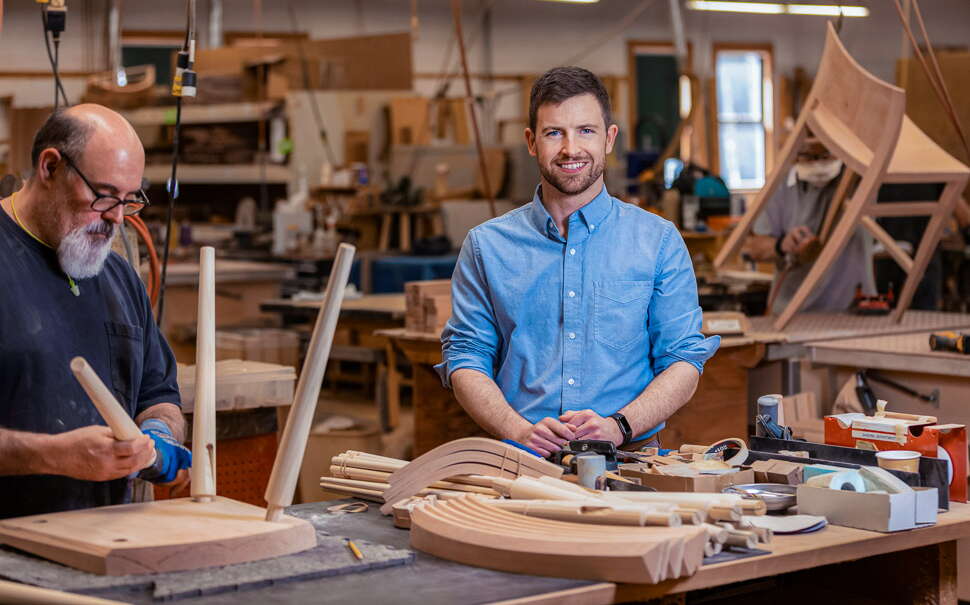
Business transitions: New owners seek to honor legacies while eyeing the future
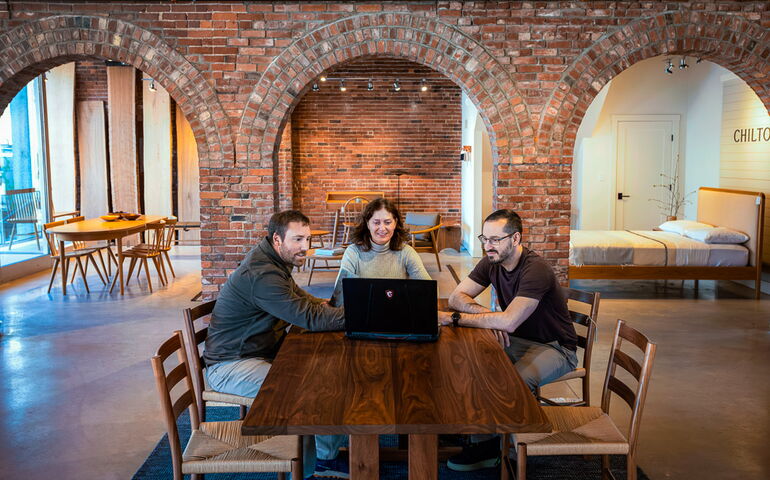 Photo / Tim Greenway
Jen Levin, president and owner of Chilton Furniture, meets with showroom manager Zac Brubach, left, and Adam Goldberg, a sales floor team member, at the Portland store.
Photo / Tim Greenway
Jen Levin, president and owner of Chilton Furniture, meets with showroom manager Zac Brubach, left, and Adam Goldberg, a sales floor team member, at the Portland store.
Business transitions range from generational succession to local investors to buyers looking to change careers.
A theme? How to maintain legacy brands while revamping with new ideas and growth potential. For sellers, it generally means determining the business’s worth in order to set a sale price.
The sales of two notable Maine furniture firms illustrate the opportunities and challenges.
Presidential libraries
In January, Thos. Moser, a high-end maker of hand-crafted furniture in Auburn, sold to Portland holding company Chenmark, an employee and family-owned firm that acquires and operates small businesses.
In 1972, Thomas Moser was a professor who quit to make furniture, becoming a national brand sought by the likes of presidential libraries, corporations, law firms and dignitaries.
The furniture is sold direct to consumers and through retail channels from stores in Freeport, Boston, San Francisco and Washington, D.C.
The process evolved to include technology such as CNC machines but always retained its handcrafted and handfinished roots, using materials like American black cherry and techniques such as dovetail joinery.
About a year ago, the Moser family and Chenmark connected as part of the latter’s interest in working with companies looking to transition ownership.
Long-term holds
Chenmark started about a dozen years ago as a partnership between James Higgins, his wife Trish and his brother Palmer. Coming from corporate careers, they pivoted to creating an employee-owned company that would work with small to medium-size businesses to preserve legacies and position them for long-term success as part of a permanent holding company. Their criteria include durable demand for the product or service, strong local or regional market position, a track record of consistent profitability, cash flow between $1 million and $5-plus million and a committed team with aspirations for the future.

Their first acquisition was a landscaping company in Portland. The portfolio grew to include a lawn care company and boat tour operators in Maine, and others across the U.S. and Canada.
Thos. Moser came on the radar thanks to a Chenmark vice president, Philip Hussey, who grew up in southern Maine and is part of the family that owns Hussey Seating Co. in North Berwick.
Hussey made a point of being active in the business community, connecting with potential sellers.
Working with leadership
Throughout 2024, he worked with Thomas Moser (who recently passed away), his son Aaron, who was running the company, and their advisors.
After many conversations between the Moser Family and Chenmark, which became more and more formal as the months went on, the Moser clan decided that Chenmark was the right home for the company they had built over the past five decades.
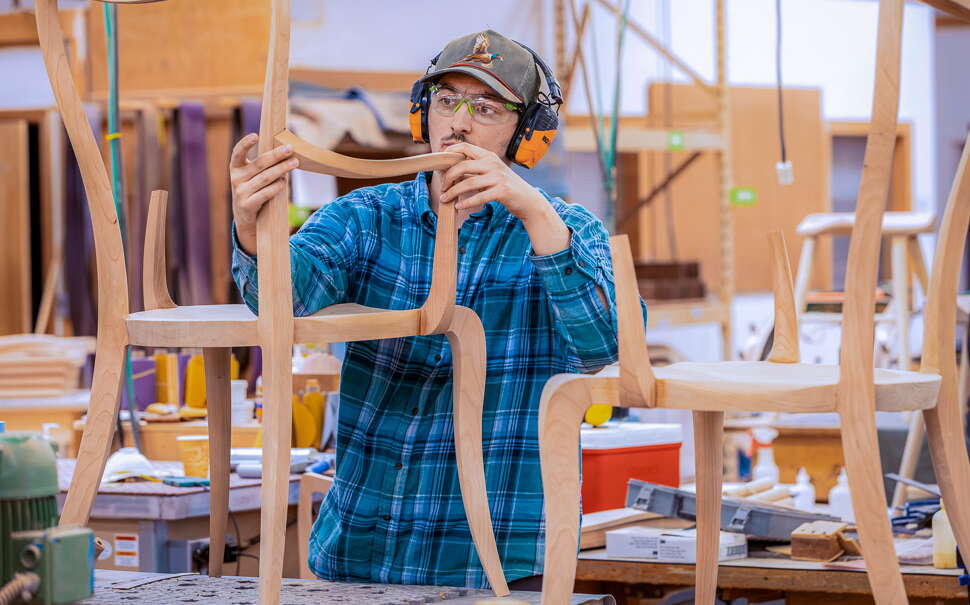
Hussey was named CEO and works closely alongside Moser’s existing leadership team, whom he credits for a smooth transition from the day-to-day perspective. Aaron is staying on in an ambassador role.
“Today he was helping me talk with customers about different projects,” says Hussey.
With the third Moser generation invested in their own careers, it was clear that a sale was the right path forward for the business.
Operations continue to be based in Auburn, where the company, operating in an 80,000-square-foot workshop on Wrights Landing Road, has 110 employees — half craftspeople and half administrative, sales and support staff.
Learn and understand
Chenmark doesn’t come into an acquisition with a wholesale suite of changes, says Hussey. Its approach is to learn about the business and figure out how to both protect and amplify the brand and the company going forward.
Key to the mission? The long-term hold.
“There’s no secret recipe beyond a commitment to understanding and learning and working with the team,” Hussey says. “Preserving the brand ends up being the easy part, because the team is still here — building furniture, selling, designing, invoicing — speaking the language of the brand and understanding the customer. My job is to support the team.”
Similarly, there’s no secret sauce for moving forward.
“Everyone asked, ‘Hey, what’s the plan?’” he recalls. “It’s, ‘Let’s keep doing the really good stuff we’re doing.’”
With no outside investors, Chenmark operates on its own timeline and cultivates decentralized leadership.
“There’s a big push on learning and rolling up your sleeves,” Hussey says.
While eventual growth might include opening more showrooms, having a bigger digital footprint and hiring, the main goal is to ensure that building craft furniture in Maine endures.
“As you get into the world of AI and all these white-collar jobs that can be automated, something that will never be automated is handcrafted furniture,” he says.
He adds, “For the majority of folks who work here, it’s not just a job — it’s a way of life.”
New product line
In 2014, Chilton, a furniture retailer that works with independent contractors to design and make its products, was acquired by Jennifer and Jared Levin, a New York couple previously working jobs in corporate law and finance.
As a Bates College graduate who spent childhood summers in Maine, Jennifer was ready to start a new career as an entrepreneur. On a whim, she searched businesses for sale in Maine; Chilton Furniture met criteria that included a nationally recognized brand, quality products made in the U.S., excellent management, sales and warehouse staff, and fine quality wood craftsmanship with a Maine connection.
At the time, Chilton had stores in Freeport and Scarborough and focused on cherry wood furniture inspired by the Shaker aesthetic of simple, clean lines.
She saw an opportunity to invest in the development of a new product line.
“It’s a modern take on traditional New England furniture,” through the filter of clean lines that celebrate the beauty of the wood, with historical and regional design as inspirations, says Levin.
Move to Portland
There was also an opportunity to build overall sales through moves such as enhancing online, catalog and regional advertising platforms; refreshing the Freeport showroom; revamping the website; and moving the Scarborough showroom to Portland in order to showcase new designs in front of a new and larger audience.
“When we joined in 2014, we said we’d like to expand and offer a variety of wood species and have our own unique line, work with a creative team and develop our own style,” says Levin. “It’s been an evolution.”
In 2020, they found the right Portland location in the Thomas Block, dating back to 1860 at 100 Commercial St.
The corner unit has large glass windows on two sides, making it easy for pedestrians to peer inside. Brick and off-white walls and a minimalist concrete floor offer a simple and attractive backdrop for the furniture. At the same time, it had modern features such as LED lighting, and historical features such as wood rafters and the brick walls — a clean palette and a perfect backdrop for the furniture, Levin says.
The Portland location attracts a bigger and broader audience, particularly visitors from out-of-state.
The new designs are made from U.S.-sourced hardwood in species that include maple, cherry, walnut and white oak. Most pieces are built when they’re ordered.
“We wanted to put our newest designs in front of a new audience, or just get on the radar and show people that we’re here and we’re doing different things,” says Levin.
The company maintains its Freeport location, which showcases the company’s full collection while the focus in Portland is on Chilton’s newest designs.
All together, Chilton offers about 175 products and sells about 1,850 products per year across all channels, with many repeat customers. The Portland store sees average foot traffic of 220 per month, counted by group or family, swelling to about 380 per month in the summer.
From store to brand
Levin says the goal was to transition from a furniture store into a brand, aided by outside consultants for key roles such as furniture design, creative direction, information technology and photography, along with employees who had the interest to train for new or expanded roles such as project management and marketing.
“We basically try to see who is interested in what and give them that role,” says Levin. “It’s been a great experience, just watching people who are passionate about this and, in some cases, developing a passion because we’re bringing in some people right out of college.”
With 11 employees, Levin maintains an inclusive approach.
“We let everyone have a say,” she says. “I think everyone likes that we get buy-in. Every once in a while there are other perspectives that help me frame a strategy. I don’t ever want to have a company where people don’t feel they’re being heard.”








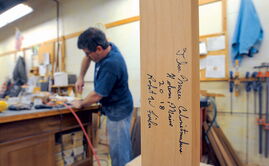
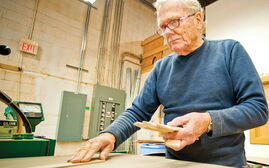




0 Comments